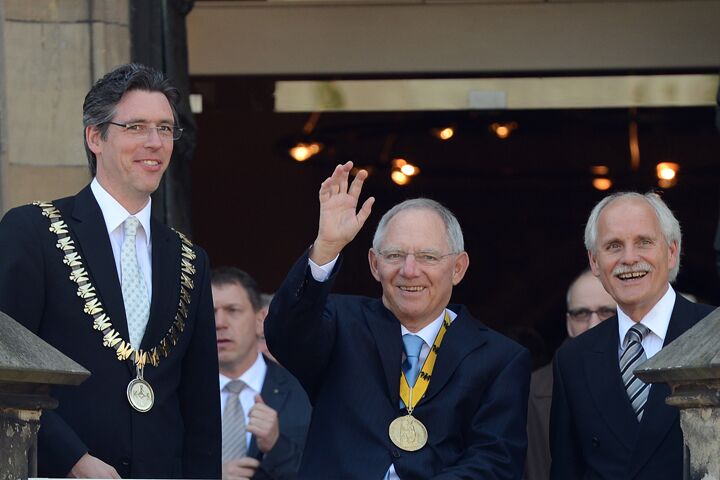
Europe Needs a New Charlemagne, Says German Finance Minister
Europe must forge a political union with a strong figurehead, German Finance Minister Wolfgang Schäuble said in Aachen May 17 as he collected the Charlemagne prize for outstanding commitment to European unity.
The award ceremony is an annual reminder that the leaders of the European Union see themselves as following the path of Charlemagne. In his acceptance speech, Schäuble laid out his vision for a “new form of political order” in Europe, led by a single European leader.
Schäuble’s speech made clear that European leaders want to recreate a Charlemagne-like empire.
The euro crisis has taught us that “a common monetary policy also requires the pooling of important parts of the financial and economic policy,” he said. But Schäuble envisions Europe going further. “We’ve got to create a political union now,” he said. The European Commission would become a European government, but, most importantly, Schäuble said he wanted a single European president, elected by “direct popular vote across the European Union.”
“I would be for the further development of the European Commission into a government,” he said.
And while this change would require “evolution, not revolution,” Schäuble warned that “the world will not wait too long for us and therefore it is important to act quickly.”
The Legacy of Charlemagne
In his speech, Schäuble praised Charlemagne, holding him up as a role model for modern Europe. The medieval emperor held Europe together “not only militarily, but also through educational reform, the introduction of a single administration and European literary culture,” he said.
He continued: “Charlemagne also had very similar problems that we modern Europeans do” as he introduced “the silver denarius, creating a single currency area.”
The night before, Christine Lagarde, managing director of the International Monetary Fund, praised Charlemagne for the same reasons. “Charlemagne is often referred to as the Pater Europae, the leader who forged a cohesive unity out of a divided western Europe, and unleashed an intellectual and cultural revival,” she said. “He is also famous for his economic reforms—he harmonized and unified a complex array of currencies, introducing a new currency standard, the livre, based on silver.”
Astoundingly, she also praised Charlemagne’s rule as an “age of peace.”
While trying to walk in the footsteps of Charlemagne, these leaders hide where those footsteps led.
They talk of literary culture, a Carolingian Renaissance and a new silver currency. But they skip the wars, brutality and massacres.
“The first three decades of Charlemagne’s reign were dominated by military campaigns,” says the Encyclopedia Britannica. Charlemagne was really a bloody dictator who, like Hitler and Napoleon, tried to subdue the continent of Europe.
His most stubborn enemies were the Saxons, in north-central Europe. Charlemagne didn’t just slaughter Saxons on the battlefield. At one time he executed 4,500 Saxon prisoners.
But perhaps Charlemagne’s longest-lasting achievement was to introduce Europe to new brutality in forcing people to convert to Catholicism.
The New Encyclopedia Britannica says: “The violent methods by which this missionary task was carried out had been unknown to the earlier Middle Ages, and the sanguinary [bloody] punishment meted out to those who broke canon law or continued to engage in pagan practices called forth criticism in Charles’ own circle” (“Charlemagne, Emperor”).
Charlemagne was allied closely with the pope. Thousands of Saxons were forced into being baptized into the Catholic faith. Strict laws enforcing Catholic worship were enacted throughout Charlemagne’s European empire. The penalty for cremating someone, the old pagan way of dealing with the dead, was death. In contrast, the penalty for murder was to pay compensation to the man’s family, provided the murdered man wasn’t a priest, of course. All children had to be baptized before they were a year old. Unauthorized public meetings were outlawed (so observing the Sabbath on Saturday was illegal).
This is the legacy that European leaders praise—a bloody relationship between church and state.
This legacy of Europe is a powerful warning. Has a large part of Europe ever been united under one man, and not gone on to inflict massive bloodshed?
Schäuble praised Catholicism as one of the pillars that unites the Continent. “What unites us Europeans?” he asked. His answer: “It has something to with the Judeo-Christian character of Europe in its infancy, with the legacy of classical Greece—the triad of Athens, Rome and Jerusalem.”
The legacy of Charlemagne shows us what is coming next for Europe. History shows that to really be united, the European Union needs the help of the Vatican.
History shows that violence and Catholicism are the only ways to unite Europe. That’s the only way Europe has ever been united in the past. The weapons may have changed since then, but not the character of the people.
This is the direction the unified government and single leader that Schäuble wants will lead. It has to—that is the only direction it has ever gone in the past. After all, they are following in the footsteps of Charlemagne.
Europe’s history gives a powerful warning for us today. To understand this history and gain vital insight into where Europe is heading, read our free booklet Germany and the Holy Roman Empire. It will clearly show you how every leader of a united Europe has led the continent in this direction, and how this will happen one last time.
